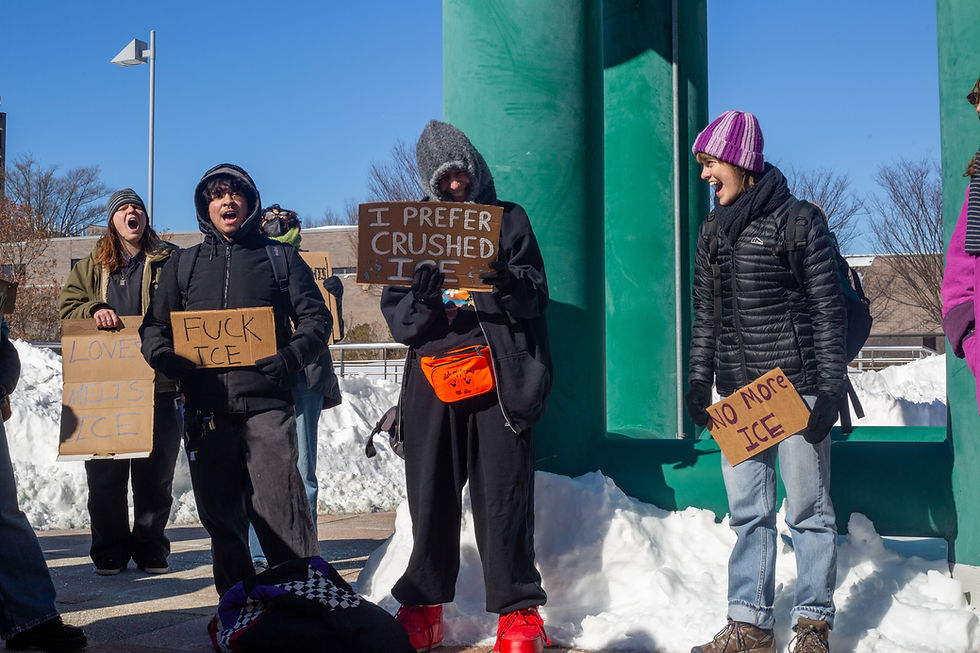Unfilled Seats, Untapped Potential: Student Senate Seeks Participation in Ongoing Election
- Jennifer Ward
- Feb 26, 2024
- 3 min read
Updated: Mar 17, 2025
By: Paige Merz
Photo of a posted flier featuring Chanelle McKenzie (Photo by Paige Merz)
In the heart of Purchase College’s vibrant campus, lies the understaffed and underrepresented Student Senate, serving as a vital voice for the student body, almost behind the scenes.
Currently, there are only 12 of 24 seats filled, according to the newly-elected Chair of Student Senate and sophomore, Sophia Pallozzi. “We didn’t have a lot of people wanting to join the Senate but it's also people don’t know how,” she said.
The Student Senate is a vital legislative body within the Purchase Student Government Association (PSGA) that advocates on behalf of the Purchase College community by voting on on-campus initiatives and budget distribution.
The board includes different backgrounds and communities, each with assigned senators, aimed at incorporating diverse perspectives on relevant issues. Some examples of this could include: commuting students, positions for each residence hall, and those representing academic sections, such as liberal arts or sciences.
The PSGA aims to boost student interest by adding the possibility of gaining credits through internships due to positions on the Senate being unpaid and volunteer only. However, Purchase would require additional payment for these course credits, according to Pallozzi.
“I feel like the PSGA isn’t talked about enough amongst the student body,” wrote Cecilia Weiss, a sophomore media studies major. “I think emails easily get lost with the large abundance of Purchase generated emails … it’s [PSGA] not a big topic on campus, there isn’t as much action.”
Adrian Graber, the student Chief Financial Officer, and a previous Senate member, suggested that the majority of the student body is not aware of how much the PSGA does for student life.
The mandatory student activity fee (MSAF) is budgeted and managed by members of the executive board and Senate and is used to fund clubs and on-campus events, according to Pallozzi.
“On top of school and on top of work, we have to find a way to incorporate that [MSAF] into student life,” said Pallozzi. “It’s frustrating because we want to do all these events and bring the community together but it’s like – how far can we go?”
The PSGA has difficulty in the ability to recognize various viewpoints and effectively advocating for correcting issues by a limited number of Senate members.
“Having more voices be heard is crucial to a working democracy, as small as we are,” wrote Graber. “We have a number of committees that need to be staffed by senators; the fewer senators we have, the more committees senators have to sit on.”
Weiss said that she wishes she was better educated on this matter because small-scale voting is important to tight-knit communities like Purchase, although she can’t see herself running for a position in the future.
Nolan Cleary, senior journalism student, and current Senate member, said that the PSGA has worked towards advertising and getting students more involved by tabling and posting flyers on campus.
“If you want to understand more about the Senate and how to get involved, I think the best solution to do that would be by going to the Senate meetings on Wednesdays,” he said. Meetings are held at 12:30 p.m. in the Student Services building and are open to the public.
“I don’t know if there are in-person events for the PSGA. but I feel like if there was, or maybe more often, it could be useful in more participation,” wrote Weiss.
Senators serving the School of Liberal Arts and Sciences, School of Arts, athletics, and Pallozzi's recent role as Senate Chair are among the positions up for election. This volunteer position offers experience and paves the way to a paid, elected role on the executive board after serving for a one-year minimum, according to Pallozzi.
“The biggest incentive for me is knowing that you are doing a job that is going to help people on campus if you want to see a change,” said Cleary.
Voting closed for positions on Feb. 23, although most titles ran unfilled or uncontested. If there is a seat that loses to the “uncontested” choice it will be campaigned for in the fall.
Election results were released on Feb. 27. Chanelle McKenzie, Jennifer Chavez, Nick Russo, Joshua Anderson, and Jared Landeros have been elected new Senators for Liberal Arts and Sciences.









Comments